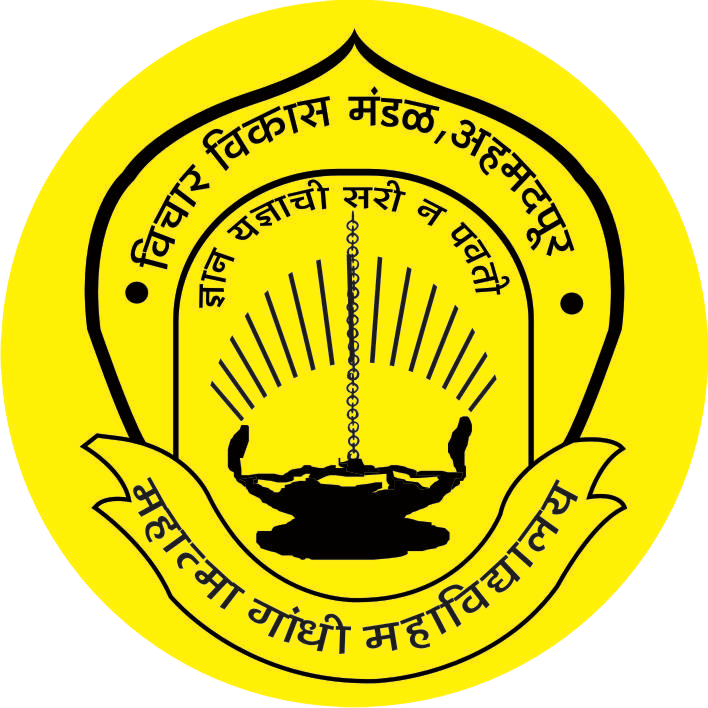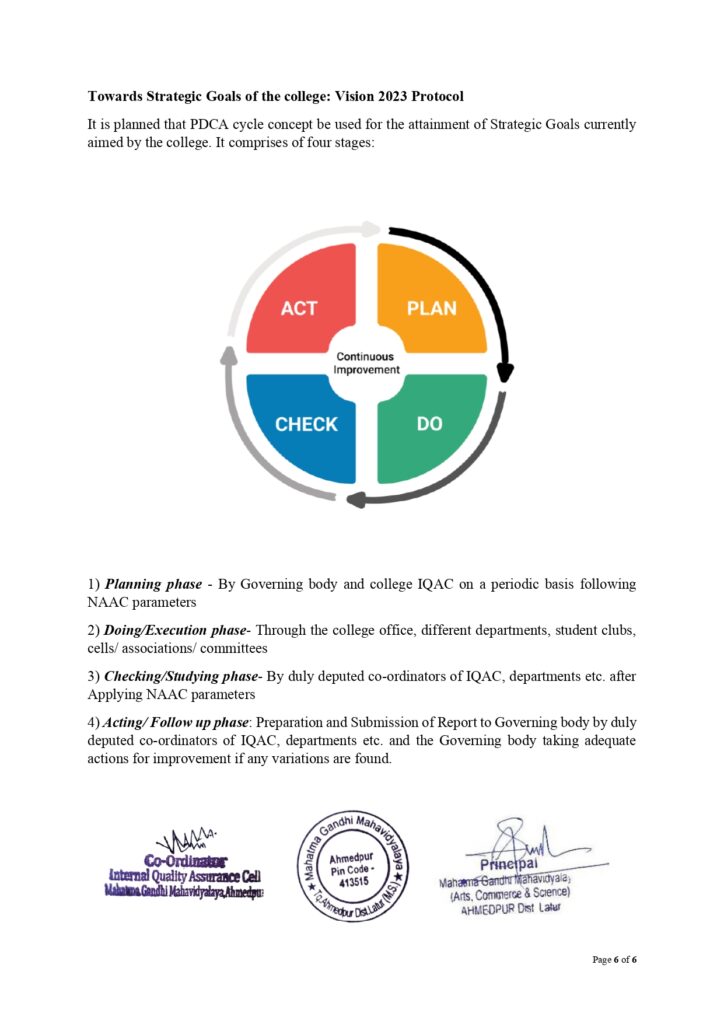STRATEGIC PLAN & DEPLOYMENT
2018-23
Vision , Mission and Goals
Vision
Commitment to the best quality higher education for achieving meaningful learning outcomes
through teaching, research, scholarship and community engagement.
Mission
Imparting excellent instruction and promoting relevant research for enabling the rural youth to
face challenges in a rapidly changing world.
Ethical, social, cultural, and physical development of the students.
Creating broadly educated citizens with scientific and inclusive outlook.
Goals
To enhance student learning and leadership skills for gainful employment and responsible
citizenship.
To achieve academic as well as overall excellence in all aspects of education.
To make continuous improvement of learning cantered environment through enhanced access
to current technology.
Core Values
Commitment to the Society
The college is an integral part of the social institutions. All the members of the surrounding
community are the stakeholders of the college and it has, therefore, a social responsibility that
consists of spreading education and thereby causing development in the society. The students
being educated at the college must emerge as socially responsible intellectuals. The academic
and extracurricular activities of the college are be based on this principle.
Commitment to Environment Preservation
The modern age is facing many hazards due to the neglect of environment. Our very survival
depends upon the protection and conservation of earth’s natural environment. The college takes
up initiatives for the propagation of Environment Consciousness.
Integrity & Ethics
The Management along with the staff and students of the college observes ethical practice and
integrity in all spheres of activities. Ethical and Moral values are of utmost importance in
drafting policies, laying down procedures and plans, executing various strategies etc. in the
college. All the academic, co-curricular and extra- curricular activities are performed by with
due integrity and ethically.
Quality Consciousness
Quality is the most important aspect of any process and outcome. The college is determined to
impart quality education to the rural youths who are, otherwise, deprived of this opportunity
due to their location and circumstances. Quality is observed in every area of activity-teaching learning, administration, cultural performances etc. in the college.
SWOC analysis
Strengths
The Management constitutes of eminent persons from different walks of life with diverse
ideologies; the variety of their experience and harmonious blend of ideologies enriches college
governance with clear vision .
The staff is dedicated and works with the spirit of commitment to their profession and duties.
The students belonging to different socio-economic backgrounds coexist without conflict. No
political/religious ideology predominates in the college. The Gandhian thought is truly seen to
be in practice.
Supportive attitude from the management towards the staff, and from the teachers to the pupils,
leads to a culture of empathy and civility in the college.
A prime geographical location on the highway gives easy access to approach from distant
places in the vicinity. A large area with ownership rights gives ample scope for the
augmentation of physical facilities.
A major part of the campus is under plantation with variety of plants and trees. Proper
environmental policies have succeeded in keeping a healthy climate in the campus.
Ample space is given to the playgrounds. There are separate Basketball courts, Handball courts,
Kabbaddi and Kho-Kho grounds, well-prepared standard running track with devoted sports
training personnel from the college staff and the alumni, which has created a glorious legacy
for the college in the field of Sports.
Weaknesses
Majority of the students come from an agrarian background. Lack of economic support restricts
their educational and professional choices. The reliance on government employment that is
scantily available and reluctance to take up entrepreneurship leads to creation of
underemployed graduates.
Being an affiliated college, the institution has to implement a curriculum designed at the
University level and has, thus, little scope for curriculum development at its own level.
A location in the industrially undeveloped area puts constraints on the collaborations with the
industrial sector.
The semi-urban geographical location also affects the enrolment ratio with the choice of
majority parents attracted to admissions for their wards in the city based colleges.
The lack of approval from the government for filling up of the vacant posts for over a period
of more than a decade has affected the teaching-learning and the administrative functions of
the college where the quality of the staff is resultantly seen to be deteriorating.
Opportunities
Increasing rate of admissions to the self-financed courses are leading towards more economic
progress which has been otherwise stunted by the lack of grants from the government.
The introduction of employment oriented certificate courses, increase in the ICT for
participating in the Global level courses are making the students complete their education with
more chances of gainful employment in a Globalized community.
With the recognition to the online courses on SWAYAM and other platforms, the restriction
of choices for education has relaxed to a considerable extent. The students are benefitted for a
better employment chance and the teachers can pursue professional development through the
online courses.
The management can carry out expansion both in the infrastructure and the academic field with
the availability of sufficient land at disposal.
Challenges
In the globalized scenario, the conventional patterns of education must adapt to the rapid
changes taking place within the world of work. The college has to make necessary changes in
its system accordingly.
Increasing unemployment is rapidly affecting admissions to the academic programmes
especially in Arts and Humanities. These programmes will have to adapt to the new situation.
With the government steadily reducing financial aid to the affiliated aided non-government
colleges, more ways to manage income resources are to be explored.
The continuation of girls’ education in an educationally backward area is difficult in spite of
supporting schemes from the government and the college management. A change in the
orthodox mindset of the parents is very slow to come.
Lack of motivation among majority students to excel in their academics and career can be seen
because of their low aims; proper motivation is to be given by the educators.
Core Competencies / Highlights of the college
Management aspects
• Decentralized, Participative management
• Wholehearted support in conduct of Academic , Co- Curricular, Extra- curricular and
developmental activities of college
• Support in research activities and accreditation processes of the college
• Ensuring the application of core values in all aspects of college
• Attempt to apply the concept of ‘E-Governance’
• Increased number of doctoral degrees among teachers
• Excellent Teacher-Student relationship
• Efficient Teaching methodologies applied by teachers
• Whole hearted co-operation of staff and students in club/ association/cell/committee
activities
• Conduct of Industrial visits, Workshops, Expert lectures, Invited talks and discussions,
Exhibitions, Symposiums, Colloquiums, Debate sessions, Conferences, Seminars,
Certificate courses, Training and orientation sessions etc. enriching the experiential
learning platform of student
• Existence of Yeshwantrao Chavan Maharashtra Open University study centre’ in the
campus
Technological aspects
• Wi-Fi connectivity in the college building.
• Application of ‘Cash-less’ campus concept to a maximum possible extent.
• Utilization of ICT enabled teaching- learning methodologies.
• Application of Audio-Visual Aids in teaching-learning process.
• Conduct of Webinars.
• Development and updated use of CMS (College Management Software).
Environmental Aspects
• Campus location in a serene and natural environment that augments the ecoconsciousness of staff and students of the college
• Eco-friendly activities promoted by the college
Financial Aspects
• Registered “Employees’ Co-operative Society” for the college employees.
• Existence of clubs for all the disciplines and programs of unique and varied nature.
Strategic Goals of the college
• To create a ‘Cash less’ Campus.
• To enhance the usage of technology blended teaching- learning process, conduct and
management of office affairs and financial transactions purely on online mode, etc. to
the maximum possible extent
• To develop fully automated college library
• To promote Research and development activities among staff and students
• To facilitate the number of book / journal publications among teaching staff of the
college by opening own publishing house
• To make staff and students of the college globally competent
• To organize maximum possible number of international workshops/ conferences/
seminars
• To ensure Compulsory Soft Skill Training for students
• To arrange for Full time coaching for competitive examinations
• To Fulfil the placement requirements of students
• To make and implement maximum number of MOUs and Linkages with industries and
higher educational institutions with academic excellence
• To address cross cutting issues, gender equality issues, other social issues etc. of the
community to the maximum possible extent through clubs/ associations/ cells/
committees of the college
• To give vocational training to maximum possible students on different courses

